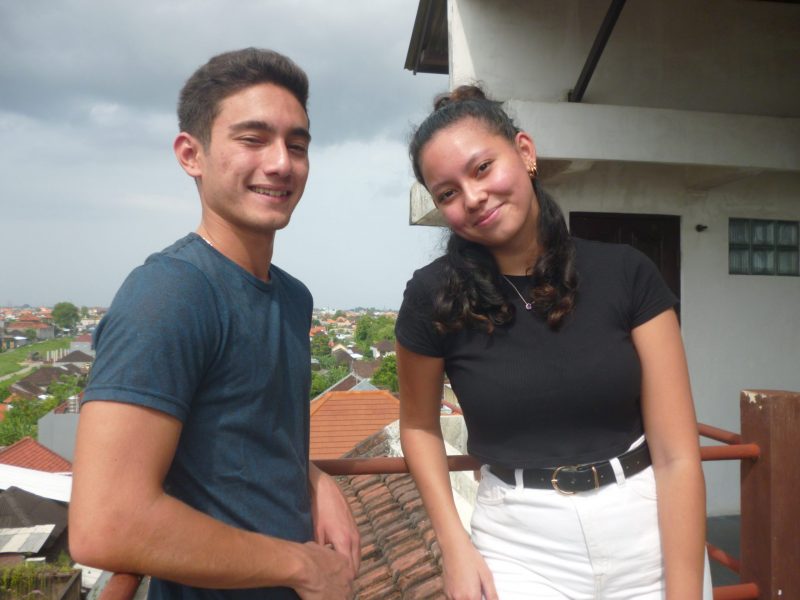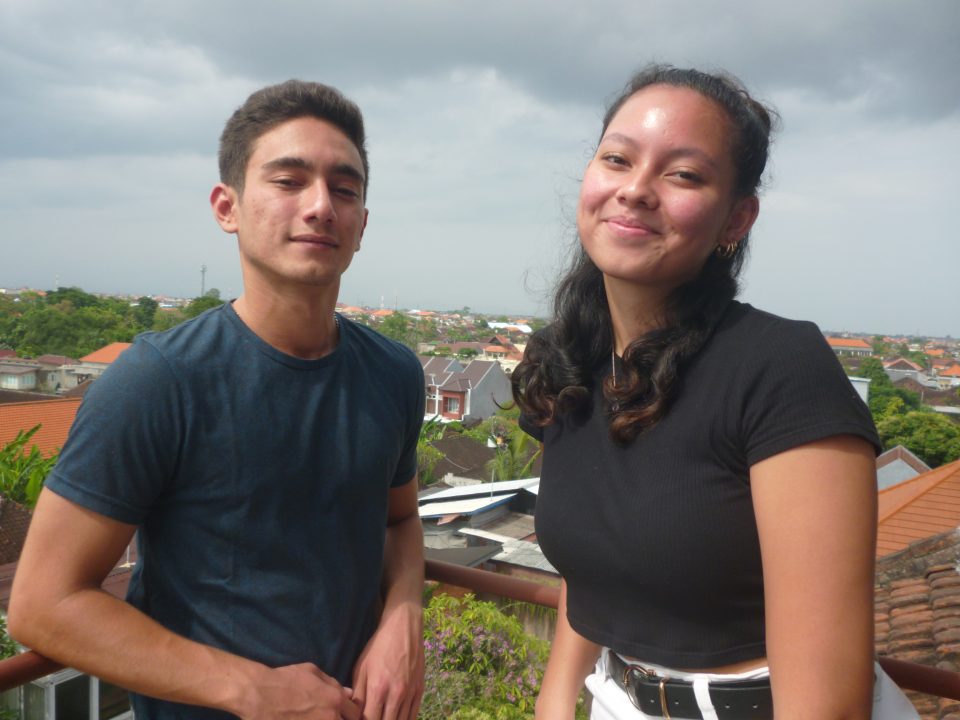Probably now amounting in the thousands, this youngster community of having mixed parents living in Bali can finally have their say about who they really are.
These so-called Bali Kids, of course not to be mistaken with Balinese kids, have been a growing sort, from a bunch to a myriad. Sadly, although becoming more and more visible, little is known about them.
It was high time to correct this with 20-year-old Luna Suwito Tricio (LST), half Spanish-half Javanese born in Spain but raised in Bali; and 19-year-old Thomas Rana (TR), half French-half Javanese born in Jakarta and raised in Bali. Discover the dreams and the power of this multicultural generation that has so much to bring to Indonesia and the world…
What are you doing now in this time of pandemic?
TR: I study Hospitality at a university in Bali.
LST: I was studying in Madrid but because of COVID-19, I came back. I’m into Communication and Digital Media.
Is it easy or difficult to grow up as a mixed-race kid in Bali?
LST: I started at the English-speaking Sunrise School from grade 1 to 3 and for me, it was kind of difficult because there was a very big separation between the Indonesian and Western kids. We, as mixed kids in the middle, were like, “What do we classify as? Where do we fit?” Once I came home crying, I was 7 years old and I asked my mum “Am I Indonesian? Am I a foreigner?” It was heart-breaking for her too. But as I grew up, it became easier because I met more mixed kids and I understood we are not one or another, we are both.
TR: For me, it was pretty easy in the French school of Bali. Since grade 1 everybody speaks French and there was no real separation, well, there was… but everybody speaks French so it didn’t matter much.
How were you considered by your teachers?
LST: In general, they were fine. In SLK, I followed the national curriculum as well and there was this one teacher who was always talking bad about the mixed-race kids, saying full race Indonesians were better than the mixed ones. It was mean to say. We had an exam and then who got the highest score? All the mixed kids! We were so proud of ourselves!
TR: In the French School of Bali, they were making no difference at all.
Outside of school, how was it like in your daily life? When you go around, with your parents, your friends…
LST: Easier than at school. There were only local adults asking “Where are you from?” or “Dari mana?” or commenting “You’re bule! Oh my God, that’s so cool!” It was completely fine outside school but not inside.
TR: It was weird because when I hung out with a friend like myself or a foreigner, they were seeing me as an Indonesian but local people were seeing me as a foreigner.
The common perception here, for Balinese people, is calling kids like you, “turis”. Do you confirm that?
LST: Yes.
TR: Definitely!
How were you perceived in your foreign parents’ country? Luna, in Spain for instance…
LST: They were thinking I was from the Philippines, Mexico, Hawaii… No. I’m Indonesian and Spanish. They didn’t think I look like a Spaniard and even in university, nobody would think I’m Spanish unless I speak Spanish. Likewise in Indonesia. They wouldn’t believe me until I speak Bahasa Indonesia.
What about in France, Thomas?
TR: Some people there wouldn’t even know where Indonesia is, but when I mentioned Bali, they all had heard of it and knew! That’s one thing. The way of living there is very different. I didn’t like it when I was little because I didn’t have the freedom that I had in Bali. I didn’t like having to live inside constantly.
In Bali, where do you fit in? Who do you hang out with socially?
LST: I think I tend to mix with people similar to myself as it was difficult for me at school. Growing up, I was more in the company of other mixed kids, but also with full Indonesian kids. I went on to study at SLK and there is a majority of Indonesian students there and not many Westerners.
TR: It’s different at the French School of Bali as there are a lot of Western kids, a fair number of mixed ones like me and a small proportion of Indonesians. Since a very young age, I’m used to hanging around with Westerners. I like to go around with different people, including friends who don’t go to my school.
According to this ability to fit in with different people that you seem to have developed here in Bali, do you think you’ll be able to mix easily in the future? Do you think you can embrace the whole world?
LST: I don’t know where I see my future because I grew up here and studied in Spain. I still have to figure out which one I like more. It was hard in Spain because they were saying “You’re not Spanish!” During the first months of university there, I had an identity crisis, I felt horrible about it. It was like Sunrise School all over again. I resolved myself to the fact that I couldn’t do anything about that. I didn’t know much about the Spanish culture because I grew up in Indonesia. I told myself: learn, be open to learning and adjust yourself. After that, it became so much easier. Teach me about Spain! And my friends there were very helpful. I became more comfortable. Still, I don’t know where I see my future…
TR: Before studying Hospitality in Bali, I went to France in a business school and the first few months were also hard. People didn’t see me as a Frenchman so it was a bit difficult to fit in but it got easier when I gained confidence. After a while it was good. My future? In Bali, we have the opportunity to meet people from all around the world and it helps us to be more open. That’s a good thing because I have chosen to study Tourism.
LST: People I met in Spain who didn’t have the chance like us to meet people of many different cultures were much more closed-minded. I agree with you, Thomas!
TR: All the kids in Bali from many different schools are used to be together. But in Europe, I think, they stay together in a much more limited circle.
Do you know that not too long ago, when you were born to a foreign father in Indonesia you would automatically become a foreigner too? Like you were rejected by Indonesia. Fortunately, the law has improved a bit and you may now possess double nationality until the age of 21 until you need to opt for one or another. How do you feel about this?
LST: I’m actually doing the whole process now! It’s horrible! I have to go back and forth to the Spanish embassy in Jakarta because I chose to give up my Spanish nationality. It’s never-ending paperwork and it’s very frustrating. I have been so stressed about it! It’s such a weird feeling to have to give up one passport for the other. I felt very bad doing it because it’s like telling: “I don’t want your nationality! It kind of broke my heart!”
TR: I haven’t thought about it yet because I’m still 19, although I’ve already discussed it with my parents. But nothing is decided because I’m not sure what I want to do. It depends on where I want to live in the future. But in my mind, I will always be French and Indonesian, for the rest of my life…
How do you feel when you go to your foreign parents’ country?
LST: Bali is always home. I really like Spain; the culture, the food but it never felt like home to me. I realised that when I left Bali for university. But I have a deep emotion with Spain – it’s not just another foreign country.
TR: France has never been home to me either but I like France! It’s a nice country! I think I will never live there for a long time, like ten years. Of course, if I go there to visit family, for example, I like it.

Do you feel privileged to have been raised here in Bali as a mixed-race kid?
LST: Very privileged! There are so many of us, and like Thomas said before, we are exposed to many different cultures that you grow up very open-minded, always open to anything. I have always thought about it, just look at Indonesia in itself, it has so many different cultures. Bali has lots of people from all around the world, giving you extra knowledge and preparing you more.
TR: I agree. Being exposed to many cultures gives us the courage to speak to anyone. I guess, in the future, it will give us much more opportunities at any level, from personal to professional.
The terrible question now: do you think mixed-race kids are the answer to racism?
LST: First, you think “Oh yeah that’ll solve everything.” No matter what, racism will still exist because you always have some people who feel superior to others. I don’t know what the cure to racism is. It’s such a complicated topic. I experienced many situations of racism in Spain as an Asian, most of it because of COVID-19.
TR: I watched this video some time ago where you have 20 people from different nationalities in a room and they are waiting for the results of a DNA test after giving a blood sample. The results showed they are all already mixed! Once they realised this, they hugged each other and understood the process of mixing has already started ages ago. Still, I don’t think this only will solve racism.
Were you exposed to racism in Indonesia?
TR: Growing up in Bali, no. But people everywhere have stereotypes, including here.
LST: Heavily in Spain. People here seem to be more used to anything foreign.
How do you call yourselves?
TR: The Bali Kids…
LST: Yes, the Bali Kids. Of course, not the Balinese kids.
Do you know that Indonesians have been calling people like you “Indos” since Dutch times like you were only one half?
LST: Oh ok…
TR: No, I didn’t know.
You surely have noticed already that here, the perfectly good-looking entertainers are mixed people, in TV series or advertisements. We mostly see people like you right?
LST: I feel it’s so stereotypical! You always want something you don’t have. Indonesians want a longer nose and fairer skin. The Westerners want to be tanned and eastern features. You can never satisfy everybody because it’s a complex world! I just feel weird about it.
TR: We all know friends here who have a career as actors or models. And true, they don’t look much like typical Indonesians!
To conclude, do you feel enriched being of two cultures or do you feel a bit lost in the middle?
LST: It depends on the situation! When I was in primary school, I would have preferred to be “one”. But now, I’m cool, I’m from two places and that’s amazing! You bring both with you with pride. We are our own little community here.
TR: I love it being of two cultures.
To end this interview, a stupid question like the one Indonesian law is forcing you to answer at 21 by not allowing double nationality: do you feel more Indonesian or more foreign?
LST: It’s a horrible question! But I would say Indonesian because I was raised here.
TR: Same for me!
Also Read Indonesian Citizenship Concerns for Children from Mixed Marriages




